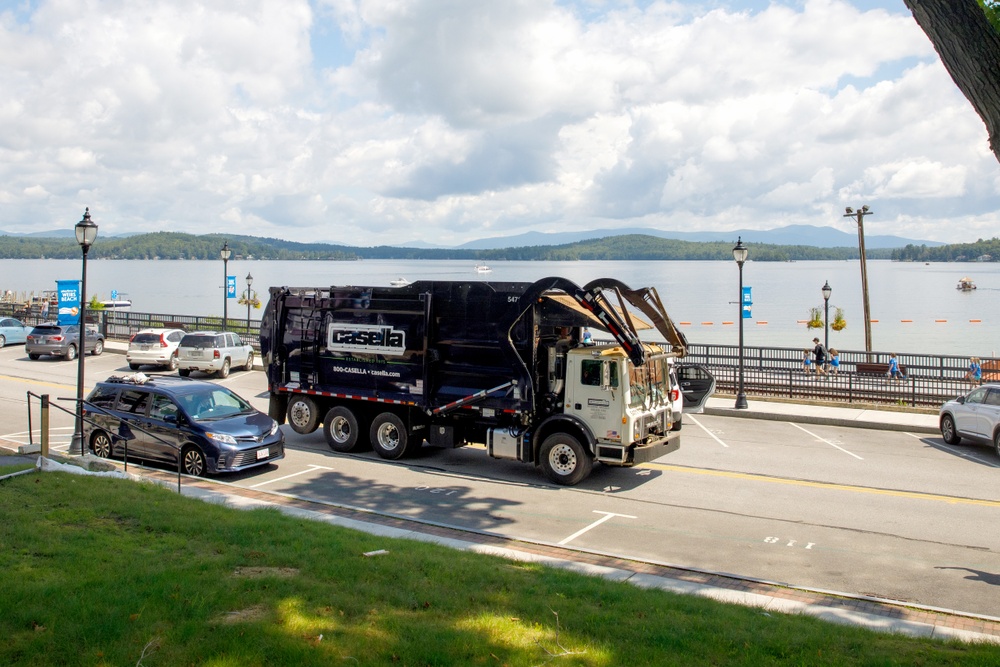Modern Materials Management in New Hampshire

Modern solid waste and resource management relies on an integrated set of solutions and critical infrastructure designed to capture material from the waste stream, put it to a higher and better use, and keep people and our natural environment safe. This approach considers the overall benefits of the entirety of our efforts, and not simply those of a single facility, in a single location.
Years ago, each town was responsible for its waste disposal, and they generally achieved this through what was then known as the “town dump.” As society became more aware of the need for better environmental protections, increased regulations, and advanced infrastructure, society shifted from that model, began implementing recycling programs, began closing unlined landfills, and the number of active disposal facilities throughout the northeast became fewer.
Today, being cooperative and borderless in concept creates a regional marketplace for recycling and waste disposal that makes economic and environmental sense. Transfer stations aggregate waste and recycling from smaller vehicles into larger trailers, and those trailers are then hauled to locations that are further away. New Hampshire recycling programs, for example, exist primarily due to recycling facilities located outside of the state, while disposal sites throughout New Hampshire accept a portion of waste from bordering states. Ultimately, this means fewer trucks on the road, fewer facilities to construct and operate, and more opportunity to commit resources to the research and development of innovative new processing capabilities, and environmental protections.
In September 2022, the New Hampshire Department of Environmental Services (NHDES) published an updated Solid Waste Management Plan. The plan outlined eight specific objectives designed to improve solid waste management in the state over the next decade, and to assist the state in achieving its goal to reduce the disposal of municipal solid waste (MWS) and construction and demolition debris (C&D) by 25% by 2030 and by 45% by 2050.
Casella’s proposed Granite State Landfill will be similar in size and scope to the existing North Country Environmental Services Landfill (NCES) located in Bethlehem and will provide the necessary disposal capacity for more than 60,000 customers throughout New Hampshire that will be needed when NCES closes after 2026. The public benefit demonstration submitted as part of the solid waste permit application for GSL addresses the goals as outlined in the state’s plan, aligns with the state’s solid waste hierarchy, and includes specific actions designed to assist the State in achieving each goal through four main elements:
- Residential Recycling Outreach and Education
- Resource Management Planning for Large Generators
- Innovation and Circularity Pilot Programs for Targeted Material Streams
- Infrastructure Needs Assessment
What is outlined in this public benefit demonstration is not theoretical. Included in the documentation are real-world examples being deployed every day, in New Hampshire and beyond, that are helping businesses, municipalities, and others achieve their sustainability goals both economically and environmentally.
Examples include Casella’s award-winning work with New Hampshire manufacturer Hypertherm, zero-waste initiatives being undertaken at Boston University, reuse programs deployed in partnership with Goodwill of Northern New England, and cutting-edge recycling education being delivered directly to customers through their mobile devices to improve recycling at the residential level.
In addition to the necessary disposal capacity proposed at GSL, Casella is also proposing to build a state-of-the-art material recovery facility (MRF) in New Hampshire. The MRF would be the first of its kind in the state and is expected to process approximately 40,000 tons of recyclables per year, which would include approximately 29,000 tons of recyclable materials collected in New Hampshire that are currently processed at another facility in Massachusetts. The new facility will reduce the time and costs associated with transporting New Hampshire recyclables from the curb to the MRF and will help to incentivize additional recycling by New Hampshire municipalities and businesses. The climate change impact associated with recycling this additional volume of material is significant, creating a reduction in greenhouse gas emissions of 29,441 metric tons of carbon dioxide equivalent annually based on the US EPA Warm Model.
This approach to modern materials management will move New Hampshire forward from its position today and open new opportunities to recycle more, giving resources new life, and preserving its natural environment for years to come.
About Casella Waste Systems, Inc.
Casella Waste Systems, Inc., headquartered in Rutland, Vermont, is one of the largest recyclers and most experienced fully integrated resource management companies in the Eastern United States. Founded in 1975 as a single truck collection service, Casella has grown its operations to provide solid waste collection and disposal, transfer, recycling, and organics services to more than one million residential, commercial, municipal, institutional, and industrial customers and provides professional resource management services to over 10,000 customer locations in more than 40 states.
Contacts
